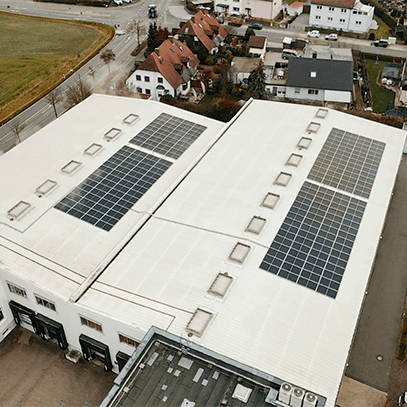
Photovoltaic system at company headquarters
The new photovoltaic (PV) system in Burgfarrnbach has been connected to the grid since 5 October 2021. The new system was installed on the hall roof and provides approximately 97,000 kWh of solar energy with an output of 99.9 kWp. The solar electricity is fed directly into the site’s own network, where it can then be used directly by Filtral. A total of 53% is used by Filtral itself, while the surplus is sold back to the Infra Fürth public grid as renewable energy. The recorded amount of CO2 saved each year amounts to approximately 40 tonnes compared with the German electricity mix. Moreover, this PV system generates enough electricity to supply the equivalent of 30 households.

Nachhaltige Lesebrillen aus Rezyklat
As an additional step towards increasing its sustainable credentials, Filtral is using recycled material, known as post-consumer recycled content (PCR), for its reading glasses. Starting in 2021, the models offered as part of Filtral’s reading aid collection were developed on the basis of recycled materials: from an initial proportion of 70% recycled materials, this figure has now been increased to 100%. The switch from conventional plastic to 70% recycled material and finally to 100% recycled material since the third quarter of 2021 has been a seamless process on the market.
Recycled materials include reused plastics such as those obtained from PE (polyethylene), PET (polyethylene terephthalate), PMMA (acrylic glass) or PCTG (co-polyester material). As a result, the recycled plastics have been used for at least one product lifecycle previously before being put towards the production of new plastic. The frames of Filtral reading glasses are made from at least 70% recycled PMMA (e.g. from plastic lenses or plastic displays). The waste plastic is cleaned, modified, crushed, filtered and processed into granules. These granules can then be melted back down and used as a raw material for new products – in frames for reading glasses, for example. The quality of the recycled plastic is comparable to that of conventional plastic. Its elevated tensile strength and surface hardness are significant plus points, while also being UV-resistant and weatherproof. In addition, recycled plastic retains an ability to take on dyes of various different colours.
Advantages of recycled plastic:
- Reduction in the use of fossil fuels
- Manufacturing process protects valuable resources and the environment
- Use of post-consumer plastic

Project Togo
Preventing and reducing CO2 emissions is a key aim of the Filtral group. For this reason, it is continuing to invest in PROJECT TOGO, a reforestation project in Togo. Since 2012, over 5.500 tonnes of CO2 have been offset (see certificate). Alongside reforestation of the natural forest, the Filtral group’s commitment is also enabling a decentralised energy supply via solar cells, creating jobs through infrastructure projects and supporting the construction of a health centre, a school and a drinking water well.
Through PROJECT TOGO, 1,000 hectares have been designated as a pure nature protection zone and are being reforested. Further information can be found here